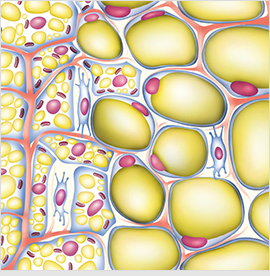Excess weight and obesity are considered the modern world’s main public health problems, both because they continue to spread and because of their serious pathological consequences.
New eating habits and sedentary lifestyles have contributed to this increase in weight, also encouraged by our genetic predisposition to create fat stores, which stems from the conditions in which human beings have evolved.
Humans have in fact evolved in environments with food shortages and this has developed our genetic ability to accumulate reserves. In such conditions, this proved to be more advantageous than the ability to offset the energy imbalance between excessive calorie intake and reduced physical exercise.
This imbalance is due to social changes that have come with economic growth, modernisation, urbanisation and globalisation in the food markets.
Diets have changed; we consume more energy-rich foods, lacking in fibre and with a higher percentage of saturated fats and refined sugars.
At the same time, there has been a drastic reduction in physical activity, as work has become less physically demanding, mobility has become mechanised, technology has arrived in the home and sedentary activities prevail in our free time.


 English
English  Belgique
Belgique Français
Français Deutsch
Deutsch Italiano
Italiano polski
polski Español
Español

